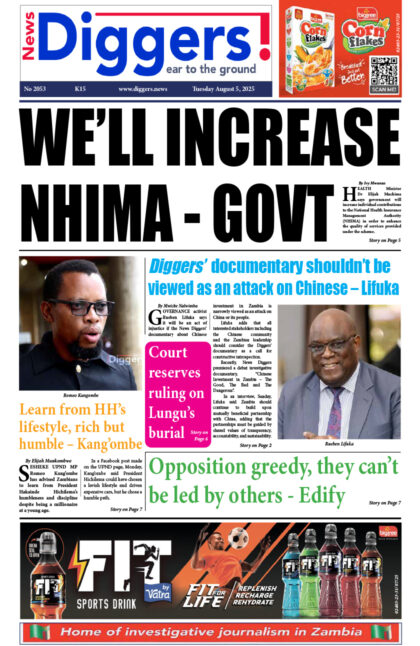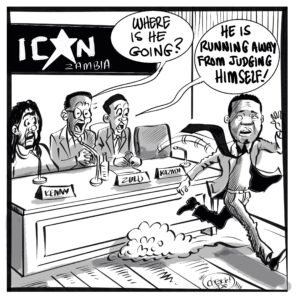We agree with those who are condemning former chief government spokesperson Chishimba Kambwili for waiting until he was fired to start seeing the corruption that is going on in the Patriotic Front government. The Roan PF member of parliament claims that he could not expose the corruption or condemn the bad decisions made while he was Cabinet minister because he needed to abide by the “collective responsibility” rule. But that just shows the kind of politician he is – a leader who has no principles whatsoever. In other words, by failing to resign in the face of corruption, Mr Kambwili is telling us that if he became president, he would expect his ministers to embrace his theft of public resources in the name of “collective responsibility”. We do not support that criminally minded approach.
But much as we would like to close our ears and hear nothing more from this Michael Sata wannabe, it is difficult to run away from the dust he is raising. Mr Kambwili is questioning the motive behind the reestablishment of a national airline. He is concerned that the move will benefit a few corrupt hands which will be involved in the procurement process. Kambwili adds that Zambia does not have the capacity to operate a national airline.
“What we said when Mr Sata was alive is that ‘let’s find a flag carrier to run the whole thing and retain shares’. They can bring the aeroplanes and paint them in Zambian colours as a flag carrier, but creating a national airline will be a loss making venture under the current circumstances… The reason government is buying jets is because some people want to get commissions in the procurement process. Otherwise, it is unwise for the government to be thinking about creating a national airline when airlines such as British Airways and South African Airways, with bigger economies are struggling,” said Kambwili.
Hate him if you want, but the talkative man has a point.
“‘South Africa’s Treasury is considering a 13 billion rand ($972 million) bailout to keep South African Airways (SAA) going as it battles liquidity challenges,’ Finance Minister Malusi Gigaba said on Friday, August 4, 2017 – a month after the national carrier received state funds to help it recover from an operating loss of R533m ($40.4 million),” reports the Business Day Newspaper.
The Airways Magazine adds: “The challenges that face South African Airways are the same that face almost any state owned airline in poorer countries with a more populist economic bent. Whenever governments own airlines, the temptation to step in and overrule potentially unpopular but necessary business decisions is simply too great.”
Indeed, just over a year ago, our next-door Air Zimbabwe flew with only one passenger on a flight from Johannesburg to Victoria Falls. Nigel Short (@nigelshortchess), the world chess grandmaster, took pictures of himself on the plane and even twitted about his experience: “I am not saying they are losing money, but I was the sole passenger on the Air Zimbabwe 737 from Jo’burg-Victoria Falls.”
So therefore, Kambwili is right to ask what the motive is behind the establishment of a national airline under such harsh economic times. What business opportunities are we seeing as a country that other airlines in the region are failing to tap? Which particular profit-making routes are we targeting to fly that others haven’t explored, and what unique incentives are we planning to offer passengers in order for them to chose Zambia Airways?
There are so many unanswered questions around this move and it raises a lot of speculations. Who is government working with on this deal? Which businessmen are these who want to partner with government in bringing back the national airline, regardless of the investment risks involved?
We ask this because some Cabinet ministers seem not to know much about what is going on around this issue or they are hiding something. On July 22, 2017, there was a news report from Russia indicating that that country’s Sukhoi Civil Aircraft company had concluded a contract with Zambian carriers to deliver four Superjet 100-passenger planes to Zambia in early 2018, including one VIP version for the President. When we asked Minister of Transport and Communication Brian Mushimba about this report, he categorized it as fake news. He knew nothing about it.
“I think it’s fake. I have no clue what that story is talking about. It does not mention the local entity the Chinese are working with…it’s not correct,” said Mushimba.
Technocrats may argue with us that we are straying into an area that we do not understand, but we still have the right to demand transparency. It is very important for those in government to be thoroughly transparent when making these agreements with the private sector because darkroom deals always pave way for clever hands to swindle the government and leave the country bleeding. Let those from the private sector who are interested in this aviation business be named, let us know their terms and conditions. Most importantly, let us record what they own now so that we can compare with what they will have gained after this business collapses again.
We are at pains to appreciate why Zambia needs a national carrier when the country is struggling to keep the locomotive industry afloat. Millions of Euro bond money have been pumped into the railway business, but what is there to point at as a milestone achievement in the sector? Nothing! But we still want to introduce a national carrier so that those in senior government positions and their families can abuse it properly – so that we make it easy for ministers to be globetrotting in business class. What a shame indeed.
Anyway, the criminality in this government has cease to surprise. We are merely witnessing a looting competition. In fact, we might as well suggest to those who are bringing back the national airline to inscribe on our aircrafts the slogan: “Zambia Airways: Taking Corruption to the Air”
























